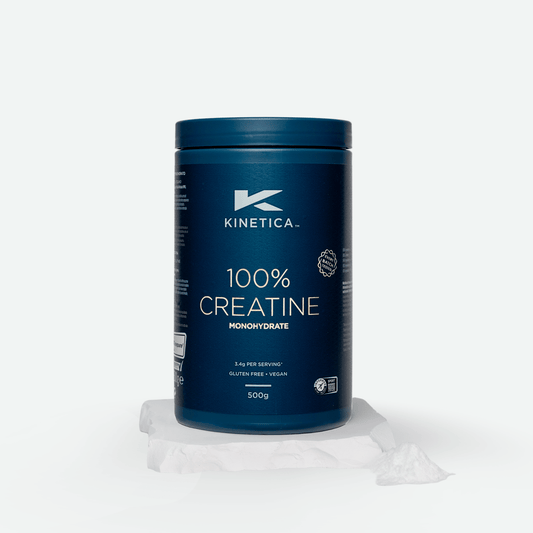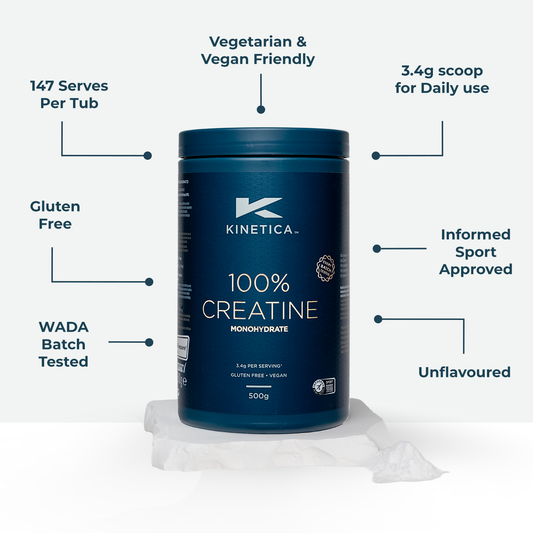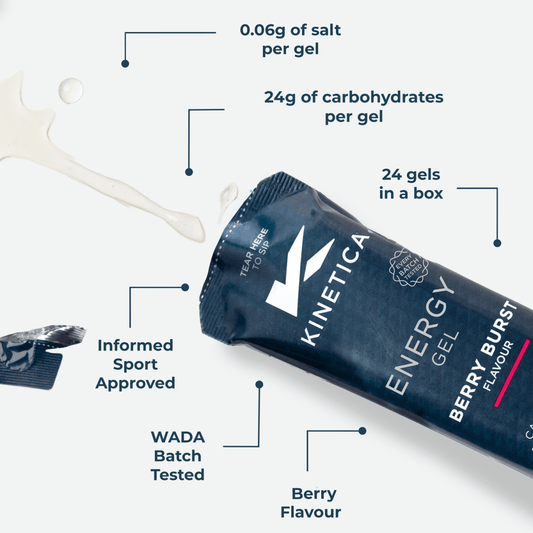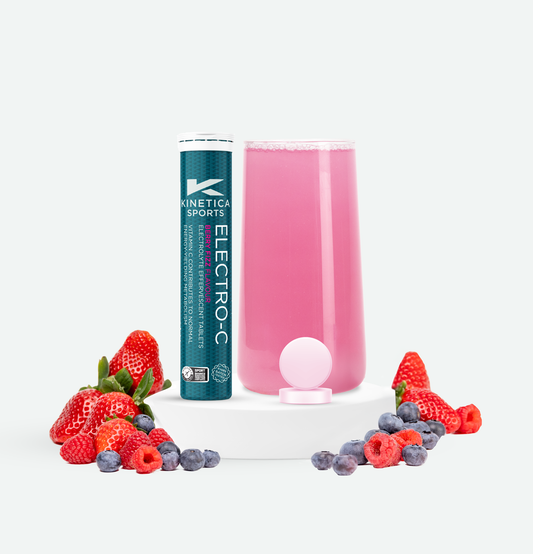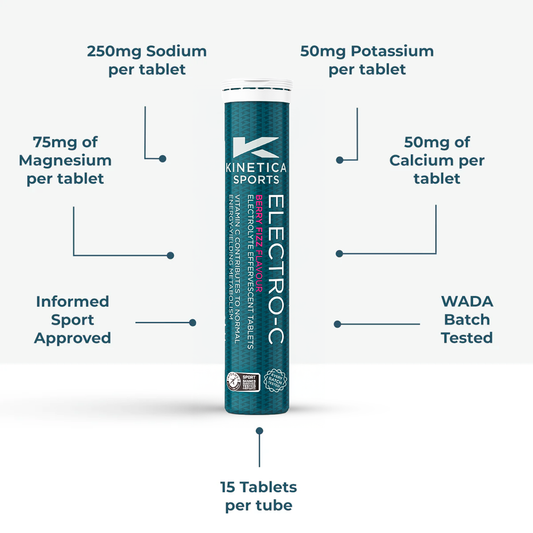Why should women take creatine?

To Recap
Looking to boost your workout performance, but not sure what supplements to take? Check out our TL;DR summary for why women should take creatine, and the benefits it can have on their diets…
- Creatine isn’t just for men: historically marketed as a men’s supplement, creatine has plenty of benefits for women too, and shouldn’t be ignored as part of your diet and training programme.
- Improved strength and muscle growth: creatine supplementation can help women increase their strength and build muscle mass, which can aid their fitness goals.
- Enhanced athletic performance: creatine has been linked to improved athletic performance and reduced muscle fatigue, leading to better results during and after a workout.
- Potential benefits for menstruation: creatine requirements change with hormonal fluctuations, and early research shows some evidence that supplementation during the luteal phase can reduce fatigue.
- Potential support for menopausal health: preliminary evidence suggests that creatine supplementation may help post-menopausal women by reducing bone density loss for better mobility.
Creatine is a popular supplement in men’s fitness, so if you equate creatine with guys lifting heavy in the strength section of the gym, you’re not alone. However, creatine is not just for men. Achieving your fitness goals shouldn’t be impacted by who you think a supplement is for – and research suggests that creatine can help women with various health and fitness targets too.
To help you understand more about this incredibly popular fitness supplement, we’ll explain why women should take creatine, and just how it can support your body. Keep reading to learn more…
What is creatine?
Whilst a lot of people think of creatine solely as a supplement, it’s important to say that it is actually produced naturally in the body. Creatine is synthesised daily in various organs, especially the liver, kidneys, and pancreas, from three amino acids: arginine, glycine, and methionine (which are obtained through your diet). Around 95% of the creatine in your body is stored in your muscles, with the other 5% being transported in your heart, brain, and other tissues1.
Importantly, of this 95%, around two thirds is stored as phosphocreatine. While we won’t go into supreme detail right now, phosphocreatine plays an important role in energy production during high-intensity exercise.
Learn more: to find out more about amino acids, check out our Whey Protein Buying Guide…
All in all, your body produces about half of the creatine you need to maintain bodily functions. The rest is obtained through your diet, namely via red meat, seafood, and animal milks. Obviously, if you follow a vegetarian or vegan diet, this is harder to come by, and you may benefit from an additional creatine supplement.
Note: there is an ongoing turnover of creatine in the body, which means you must replace it daily. That’s why your body makes it continuously, and why it’s an important part of your diet.
The most well-known and researched form of creatine supplementation is creatine monohydrate. This supplement is tasteless and odourless, making it easy to add to your training regime. Other forms of creatine are emerging, such as creatine HCL, but creatine monohydrate is currently the most researched and validated in peer-reviewed studies – and there is little current evidence to suggest that the other emerging forms are yet superior2.
Buy Now – Kinetica Sports Creatine Monohydrate
At Kinetica Sports, we use 100% Creapure Creatine Monohydrate for certified excellence. With 3.4g per serving, it’s easy to give your muscles the tools they need to maximise your performance and hit your fitness targets.
What does creatine do?
There are two ways to answer this question: one that is deeply scientific and honours fellow sports scientists and researchers; while the other which is less technical for fitness enthusiasts. We will focus on the latter, as our goal is to empower you with helpful knowledge about creatine without getting too bogged down into the biochemical details.
Simply put, creatine helps you produce energy when demands are high.
Put this in the context of a workout, and it sounds ideal, right? When you are on a mission to build your health and fitness, you want to know that you can push hard when it is appropriate to elicit training gains and then recover fast – and lots of research over many years shows that creatine helps here (as we’ll explore further below).
But how?
Central to understanding creatine is a compound in the body called ATP, which stands for adenosine triphosphate. ATP is often described as the energy currency of the cells3, because it is involved in a cellular reaction to produce energy. When you exercise at high intensities, ATP is degraded into ADP (or adenosine diphosphate), inorganic phosphate, which liberates energy for your muscles to use in short bursts.
Creatine helps recycle ATP energy production so that you have ongoing fuel to tackle a hard cardio session, strength workout or sporting activity. Remember the phosphocreatine we mentioned above? By degrading this into inorganic phosphate and creatinine, your body can turn ADP back into ATP – starting the whole cycle all over again.

Basically, by elevating your muscle stores of creatine, you can boost the availability of rapid ATP energy production. Smart, right?
What are the benefits of creatine for women?
With all this in mind, you’re probably wondering what the more specific benefits are of creatine supplementation – especially for women. Research suggests that ‘females typically exhibit 70-80% lower endogenous creatine stores compared to males’ and in general consume less via their diet4; however, somewhat contradictorily, women have been found to have a higher concentration of phosphocreatine and intramuscular creatine.
Unfortunately, current female-specific research is still in its infancy. But, there are some promising benefits already identified that support the inclusion of creatine supplements for women, including:
Improve exercise performance
As we’ve explained, creatine supplementation can support your body’s ability to generate short bursts of energy. The primary benefit of this, for weekend warriors and pro athletes alike, is that this increased energy availability can help to improve your exercise performance.
Having more energy in your muscles means you can workout harder (with heavier weights), or for longer (to complete more sets). It’s this that makes creatine one of the most popular exercise supplements for fitness enthusiasts.
Improving your performance also means you can be safer when you work out – whether by maintaining the proper form or having better stability to reduce the chances of injury.
Increase muscle strength
Unlike protein, any muscle strength gains don’t come directly from ingesting creatine. Instead, this benefit works alongside your improvements in performance – particularly with resistance exercises – to be able to maximise your gains over time. Being able to lift heavier weights, or exercise for longer, will support intended muscle strength improvements after successive workouts.

Top tip: if you’re looking for supplements to support muscle growth, explore our collection of Protein Powders. These offer vital amino acids to help you gain lean muscle mass.
Cognitive and mental health
Research suggests creatine monohydrate has neuroprotective properties that can improve cognitive function and reduce mental fatigue5.
The brain is a hungry organ that, under stress, has high levels of metabolic demands placed on it. Creatine monohydrate, as a small molecule, can cross the blood-brain barrier and is emerging as a possible therapeutic tool to help with long-term memory, mental health and cognitive function6.
Evidence of the importance of creatine in mental health can be found in a 2020 study looking at over 20,000 participants7. Researchers found that the lower the intake of creatine in one’s daily diet, the higher the likelihood of depression, with a more pronounced trend in women. By supplementing with creatine monohydrate, women may be able to protect their mental health more effectively.
It is also important to say that creatine supplementation has an excellent safety record for women. A recent systemic review and meta-analysis of the evidence showed that creatine monohydrate does not increase any risk of adverse effects, nor does it increase body weight or cause other health issues8.
Interlude from the author: this list is easy to skip, but when you take a second to pause and think about it, creatine is much more than a gym supplement. If creatine can improve how we experience the world and connect with others, it is worth reclassifying in our minds as a wider health supplement.
Menstrual support
While more evidence is needed to understand how creatine, both supplementation and endogenously produced, is affected by the menstrual cycle, there are some preliminary studies that explore how creatine supplements for women could be beneficial.
For example, there is some evidence to suggest that supplementing with creatine specifically during the luteal phase can reduce fatigue, potentially protect against protein catabolism (breakdown) and support muscle protein preservation4.
Note: the luteal phase is the second step in the menstrual cycle, directly after ovulation, where the uterus prepares for a potential pregnancy. It is when oestrogen levels are highest.
Outside of this, it appears that incorporating creatine supplements (for women and people who menstruate) can have consistent benefits throughout your cycle.
Pregnancy support
Another area of growing interest is the adoption of creatine supplements for women and pregnant people. While there is currently no direct research in humans around this, there is evidentiary backing for several avenues that scientists are pursuing. These include:
- Pregnancy is already connected with increased metabolic demand due to the growing foetus and placenta, which can result in decreased creatine stores in the parental body.
- As such, there is a research opportunity to explore whether creatine supplementation can support healthy foetal growth.
- Creatine supplementation may support foetal neuron development, reduce pre- and post-partum complications, and mitochondrial integrity.
Augment menopausal health
Menopause describes the gradual and then permanent cessation of menstruation, and is marked by hormonal changes as the body gets used to its new normal. This period of hormonal fluctuations impacts women differently, and there is still ongoing research into how the body is affected.
When it comes to creatine supplements and menopause, there are some preliminary studies to suggest that it may help. For example, research suggests that a consistent moderate dose of creatine supplements for women over 60 may reduce bone density loss in the hips and improve upper-body strength – when combined with resistance training4.
Overall, while more research is required, there are several potential benefits to creatine supplements for women to support their overall menstrual health throughout their life.
Learn more: discover more about creatine in general with our article on Creatine Benefits and Side Effects: What You Need to Know…
How to take creatine
From a practical perspective, taking creatine is as easy as adding creatine powder to your workout shake, bottled water, or yoghurt. But when you take creatine might depend on your goals:
- Pre-workout: if you intend to push hard or are about to compete in a sport, you might take creatine 30 minutes before warming up. This approach can help with energy availability during your workout.
- Post-workout: if you are looking to top up your “creatine pool” within cells, having depleted the body via training or sport, you might prefer to take creatine in your post-workout recovery shake to help with overall regeneration.
How much creatine should a woman take?
Creatine status is impacted by various factors such as age, gender, body composition, muscle size and exercise demands. Research suggests the body needs to replace 1-3g of creatine per day to maintain normal creatine stores in our muscles5, though this will vary depending on your starting point and personal needs – and can be higher because of these.
And when it comes to answering ‘how much creatine should a woman take?’, it’s not clear cut. As with most answers in health and wellness, the answer is “it depends”. Nevertheless, let us make it as simple as possible whilst still being practical…
A traditional approach to taking on creatine is with a “loading” phase5. Here, you increase muscle creatine stores by ingesting 5g of creatine monohydrate (or approximately 0.3g/kg body weight) four times daily for 5-7 days. This might translate to 20g over a day for a week. You can then transition into a “maintenance” phase by taking on 3-5g daily.
However, this approach is quite specific. If you’re willing to wait longer for creatine saturation, taking onboard 3-5g daily over a month will gradually help creatine status in the body and support your training efforts9.
Interlude from the author: Speaking anecdotally, it is worth saying that even top-flight professional athletes frequently opt for the latter and just have creatine as part of their daily supplementation. In my experience coaching premier league footballers, for example, I have yet to come across a player who does not typically defer to regular lower-dose consumption combined with other supplements to aid performance and recovery.
We like simplicity – it gets things done!
The best creatine for women at Kinetica Sports
Should women take creatine? We think the answer is a big yes!
Still not convinced? Think back to a recent workout when you pushed hard, with significant demands on your energy. Remember what it felt like in those rest periods, trying to recover between bouts of effort. It was hard, right? This is where creatine can come into its own as a dietary supplement. Creatine enables you to meet energy demands better and recover faster, especially at high intensities.
And, when you choose Kinetica Sports, you know you’re getting superb quality. All of our supplements, including our Creatine Monohydrate, are rigorously tested in compliance with strict WADA and Informed Sport standards – so you can train with confidence that you’re fuelling your body with the best creatine for women (and men).
To learn more about our range, don’t forget to explore the Kinetica Sports Blog…
The Ultimate Guide to Pre-Workout Supplements | What are the Benefits of Electrolyte Tablets? | What are Energy Gels and How Can They Help You?
Disclaimer: this article is not intended to be, nor should it be taken as, medical advice. Before adding a new supplement to your diet, make sure to discuss it with your doctor.

